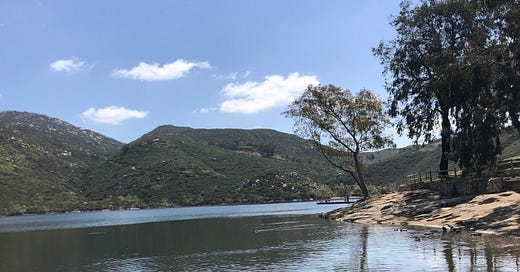Wanting and Surrendering.
It’s Sunday morning, and I’m sitting at a café table in front of two people on a first date. Based on their conversation, they met on a dating app, and now they’re talking about condiments, like ranch and blue cheese, and god forbid mayonnaise, which he is ‘weirded out’ by. It’s hard to tell what each of them are feeling, but there is some laughter and then a suggestion of meeting again, and unless she is lying, things were enjoyable enough to go out a second time.
A wave of emotion surfaces in me as I witness this encounter, and I feel deeply tender on their behalf (or perhaps it is only my own). I have no stake in the outcome of these people, but I am reminded of the rawness—and awkwardness—of starting something new and hoping for it to be good.
The reasons we start new things are reliably varied, but I think the answer is often simply because we want something. We begin a new job because it offers better pay, or a different schedule; we begin school to learn or to get a degree; we search for friends or love because we want to feel connected and supported and like we belong. We may start something new with the simple hope to feel something else, or because we are curious to discover what this or that will be like. Life is a series of overlapping cycles of beginnings and middles and endings, some of which we consciously wish will commence or continue, and others of which we fervently wish would cease.
To some extent (and depending on how much we believe in agency), we have some choice in which cycles begin. We can choose to go looking for a new experience or person; at the same time, we cannot predict when life, of seemingly its own accord, simply brings something to us, or takes it away.
Regardless of whether we’ve chosen a new beginning or life has arranged it for us, newness is accompanied by certain uncertainty. At the beginning, we become particularly vulnerable; we risk feeling embarrassed or uncomfortable; we are confronted by what we do not know. New things are ripe with possibility, and it is fundamental to our nature to want those possibilities to be good; to lead to outcomes that we want.
Often, it is our desires that propel us toward new things: paying attention to what we want can show us where to go. As Mark Epstein says in Open To Desire: The Truth about What the Buddha Taught, “[D]esire is an essential component of our human experience, that which gives us our individuality and at the same time keeps prodding us out of ourselves…If we are out of touch with our desires, we cannot be ourselves.”
It is not only ok to want love, or friendship, a new experience, a purpose, or a home—it is critical to want what we want, in order to live as ourselves and find who and what we are here for.
It is not desire that causes suffering, contrary to how Buddhist teachings (the Four Noble Truths, in particular) are often misconstrued; therefore, renouncing desire will not yield freedom. The Buddha actually suggests, as Epstein writes, that “the problem is not desire: it is clinging to, or craving, a particular outcome.” Attempting to hold on to experiences, or manipulate their outcome, is what perpetuates pain.
It is impossible to know ahead of time how something will go, or whether we will like someone or maybe fall in love, or if we actually feel better after achieving what we thought we wanted. “As far as Buddhism is concerned,” Epstein goes on to tell us, “[the trick] is to accept the fact that no experience can ever be as complete as we would wish, [and] that no object can ever satisfy [our desire] completely.”
Remembering the transitory nature of all such things in life may allow us to forge a relationship with our desires: one in which we are not afraid of them, or of the new beginnings they may bring about.
The less we try to orchestrate things to happen a certain way, the more easily they usually end up unfolding. If we continuously remind ourselves to let go of attachment to specific outcomes, we may see that life becomes a little more interesting and surprising.
May we honor our desires, and let them guide us through the doors we are meant to walk through. May we hold what we want lightly, and surrender to the flow of what happens.
May we pay attention to how we feel along the way, and see how it all turns out.
Maggie




Great post. This landed at a great time for me. I enjoy you insights. FYI - timeless. 20s and dating 56 and working through the next phase of life
Love this:
Regardless of whether we’ve chosen a new beginning or life has arranged it for us, newness is accompanied by certain uncertainty.